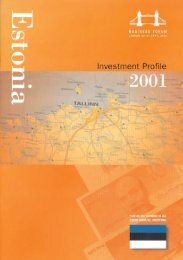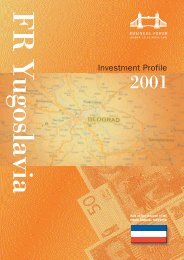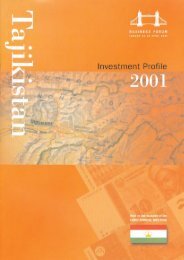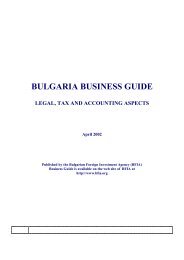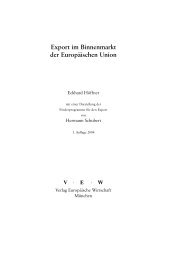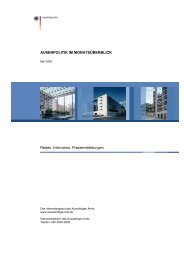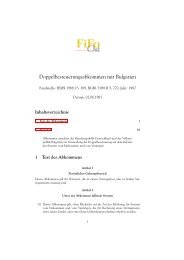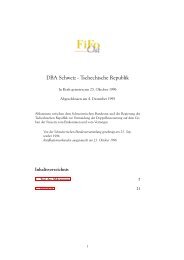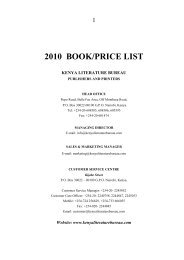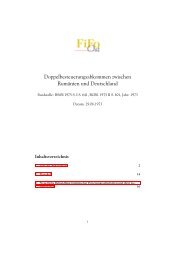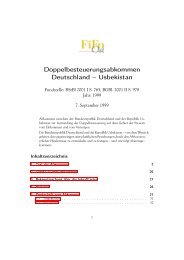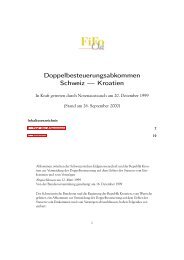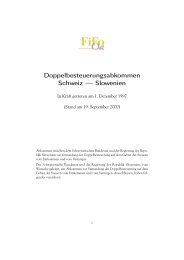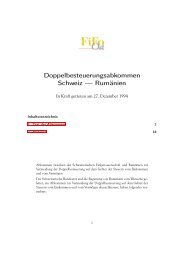Introduction - FiFo Ost
Introduction - FiFo Ost
Introduction - FiFo Ost
You also want an ePaper? Increase the reach of your titles
YUMPU automatically turns print PDFs into web optimized ePapers that Google loves.
<strong>Introduction</strong><br />
Following the political changes that took place at the beginning of 2000, Croatia embarked on the road of key political and<br />
economic changes. Important steps were taken towards improving the investment climate, progressing with privatisation, and<br />
enhancing fiscal sustainability through a Stand-by Agreement reached with the IMF. The democratic and pluralistic nature of<br />
the political institutions were reinforced. The country also restarted co-operation with and integration into Euro-Atlantic<br />
structures: in 2000, it became a member of WTO, joined NATO's Partnership for Peace Programme, and began discussions with<br />
the EU on a Stabilisation and Association Agreement.<br />
Political and economic transition<br />
After the dissolution of the Socialist Federal Republic of<br />
Yugoslavia (SFRY), Croatia was internationally recognised in<br />
January 1992. In the period between 1991 and 2000, the<br />
country was led by the Croatian Democratic Union (HDZ) with<br />
Franjo Tudjman as the President. Under these years, the<br />
country suffered from war, economic hardships created by<br />
costs of reconstruction and accommodation of displaced<br />
persons and refugees.<br />
The start of 2000 brought in a major political change. Following<br />
the death of President Franjo Tudjman, the elections that took<br />
place in January 2000, brought to power a broad coalition of<br />
pro-reform parties, leaving the Croatian Democratic Union (HDZ)<br />
in opposition. The government was formed by six parties with<br />
major roles played by the Social Democratic Party (SDP) and<br />
the Croatian Social Liberal Party (HSLS). The current Prime<br />
Minister is the SDP leader Ivica Racan.<br />
The new government won the elections on a platform of<br />
economic reform and integration with the EU, and in its first<br />
year it has accomplished significant political achievements at<br />
home and abroad. At home it has carried out a programme of<br />
constitutional changes enhancing the role of the Parliament<br />
and curtailing the extensive powers enjoyed by the president.<br />
Other changes have included measures aimed at strengthening<br />
the independence of the courts, and the rights of the minorities.<br />
The government also took steps to secure the freedom of the<br />
media, by introducing reforms of state broadcaster HRT, which<br />
had a long record of bias towards the HDZ, and designing<br />
new legislation to protect the independence of HRT from<br />
political interference.<br />
In terms of economic policy, the government started the<br />
implementation of painful, but necessary measures to further<br />
economic transition. The main objectives are to reduce the<br />
size of the government, achieve macroeconomic stabilisation,<br />
increase the rate of employment by accelerating growth,<br />
impose hard budget constraints on loss-making enterprises,<br />
Italy<br />
Austria<br />
Slovenia<br />
Adriatic Sea<br />
restructure the enterprise sector, accelerate privatisation,<br />
facilitate foreign investment, and introduce Croatia into<br />
international economic structures.<br />
Challenges met, challenges ahead<br />
Croatia<br />
Hungary<br />
Bosnia-<br />
Herzegovina<br />
Yugoslavia<br />
In the last five years, Croatia has been successful in achieving<br />
price and exchange rate stability through both tight fiscal and<br />
monetary policy. However, in more recent years, the fiscal<br />
balance has deteriorated, becoming a major source of risk to<br />
stability. In 2001, the government took some effective<br />
measures to curtail fiscal expenditures and reduce the fiscal<br />
deficit. Largely following the advice of the IMF within the context<br />
of negotiating a SDR 200 million Stand-by Agreement, the<br />
government has made pledges to reduce public sector wages<br />
and employment and made a commitment to pension and<br />
health sector reforms. (See Economic summary below.)<br />
The Croatian enterprise sector has been undergoing a difficult<br />
transition. However, some companies have undertaken major<br />
restructuring and were able to increase productivity and find<br />
new markets. For example, Victor Lenac (shipbuilding), Pliva<br />
(pharmaceuticals) and Podravka (food processing) have<br />
increased their profitability and registered impressive growth<br />
in sales both in domestic and export markets. However, the<br />
disruption caused by the war, the loss of traditional Yugoslav<br />
export markets, and the structural problems led to a decline<br />
of some traditional sectors, such as base metals, textiles,<br />
beverages and food. Tourism, which directly accounts for<br />
3.4 per cent of GDP, delivered a record performance in 2000<br />
and has the potential for continued growth in the future. In<br />
recent years, many Croatian enterprises started to expand in<br />
the former Yugoslav markets. (See Major sectors of the<br />
economy below.)<br />
To date, there has been little FDI in Croatia, but there are<br />
indications that the investment climate has been gradually<br />
improving in 2000, as evidenced by higher inflows of direct<br />
investments compared to the last two years. The bulk of FDI<br />
so far was connected to privatisation deals, with the largest<br />
Croatia Investment Profile 1



